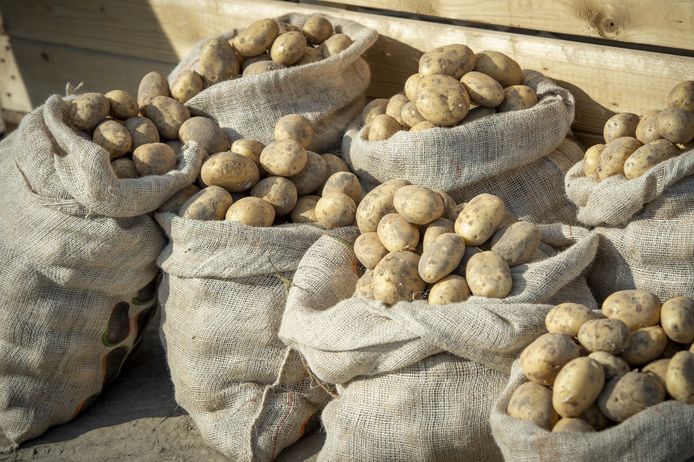The Dutch fries potato is in trouble. Nitrogen regulations in The Hague make the Dutch cultivation of consumption potatoes on sandy and loess soil so unattractive that we will soon have to source some of our raw material for chips from abroad.
That is what Andries Middag, director of the Association for the Potato Processing Industry (Vavi) predicts. He is responding to the demand of Minister Piet Adema (Agriculture) to remove all potatoes from the land before October 1 from this year. From that date, a ‘catch crop’ must have been sown that prevents leaching of nitrogen into the groundwater.
“This could result in the death knell for the cultivation of chips potatoes on sandy soil,” warns Middag. “Many potatoes are still in the ground in September and October for a reason. They must first ripen and harden off sufficiently before being harvested. That is necessary for proper processing.” If potatoes are too watery, they won’t cook properly.
Groundwater quality
The potato sector has long tried to change the mind of the Ministry of Agriculture, Nature and Food Quality. But Minister Adema refers to the mandatory implementation of the 7th Nitrates Directive Action Programme. Brussels demands that we protect the quality of the groundwater by reducing leaching.
Every arable farmer who does not sow a catch crop before 1 October will receive a reduction in the amount of permitted nitrogen for next year’s cultivation as a punishment. That means less nutrients for crops, less yield and therefore less income.
Potato grower Pieter Evenhuis from Giethoorn does not understand the mandatory date. “All kinds of government regulations nowadays encourage us as growers to live more with nature and to use less pesticides. This form of calendar agriculture does not fit in with that.” As a farmer you don’t look at the toilet calendar to see whether you can sow or harvest: that depends on the weather or the moisture of the soil.
Way too wet
The cold and wet spring is perhaps the best proof, says Evenhuis, that setting a final harvest date does not work. “I have eight employees. They have been at home regularly for the past few weeks. Simply because the land was too wet to plant potatoes.” The later the spuds are in the ground, the later growth starts and everything shifts in time.
The introduction of calendar agriculture by the Ministry of Agriculture, Nature and Food Quality saddles the potato sector with a huge logistical challenge. Many farmers are used to transporting their potatoes to the chip processors immediately after harvesting. Not every grower has large sheds to store the potatoes if he has to harvest earlier.
Many potatoes are still in the ground in September and October for a reason. They must first ripen and harden off sufficiently before being harvested.
“We have an extremely efficiently coordinated system,” says Vavi director Middag. “Factories are already running twenty-four hours a day. There is no capacity to process everything in September at once, if that were possible in terms of cultivation. From a commercial and logistical point of view, this decision by LNV is a huge miss.”
Left or right, the new rule will hurt, Middag believes. Anyone who chooses to harvest the spuds earlier misses out on yield and therefore money. And those who let them grow longer will suffer a financial blow next year due to the fertilizer discount. Farmer Evenhuis is not planning to mess up his schedule before October 1. “I am not going to change my regimen. Then a penalty reduction.”
table potatoes
The result may be that the processing industry will soon be importing chip potatoes from abroad to compensate for a decline in Dutch cultivation. This is less likely with table potatoes. These also grow partly on sand, but do not have to grow as large. Harvesting earlier is a bit easier.
Guido Schriever is an expert soil and minerals for the Limburg agricultural organization LLTB and calls Minister Adema’s obligation ‘unjust and unwise’. If the minister wants to prevent leaching of nitrate, then measure per field whether there is actually too much nitrate present.

“That’s no problem at all,” says Schriever. “You can do such a representative survey for 70 euros. And then let’s only impose a fertilizer discount on that farmer who finds too much nitrate. In this way we encourage growers to take a closer look at their fertilization and nitrate residue.” Simply shortening every farmer who still has spuds in the ground after October 1 is what the LLTB-er calls ‘disabling agronomic knowledge’.
The Ministry of Agriculture, Nature and Food Quality acknowledges that it can be puzzling for some growers. “We understand that for some entrepreneurs it is an adjustment to their business operations,” says a spokeswoman for Minister Adema. However, she emphasizes the importance of good water quality.
Four billion kilograms
Nowadays, more than half of the Dutch chip potatoes grow on sandy and loess soil. This concerns more than 40,000 hectares of the total of 80,000 hectares. “The share on sand has grown in recent years,” says Middag. About three thousand growers annually supply approximately four billion kilos of potatoes to the processing industry.
This year promises to be an excellent financial year for potato growers. Thanks to the low euro and disappointing harvests elsewhere in the world, contract prices are historically high. The windfall follows the corona years in which potato prices were particularly low.
Free unlimited access to Showbytes? Which can!
Log in or create an account and don’t miss a thing of the stars.
2023-05-01 01:00:05
#Nitrogen #rules #drive #fries #wheels #foreign #fries

